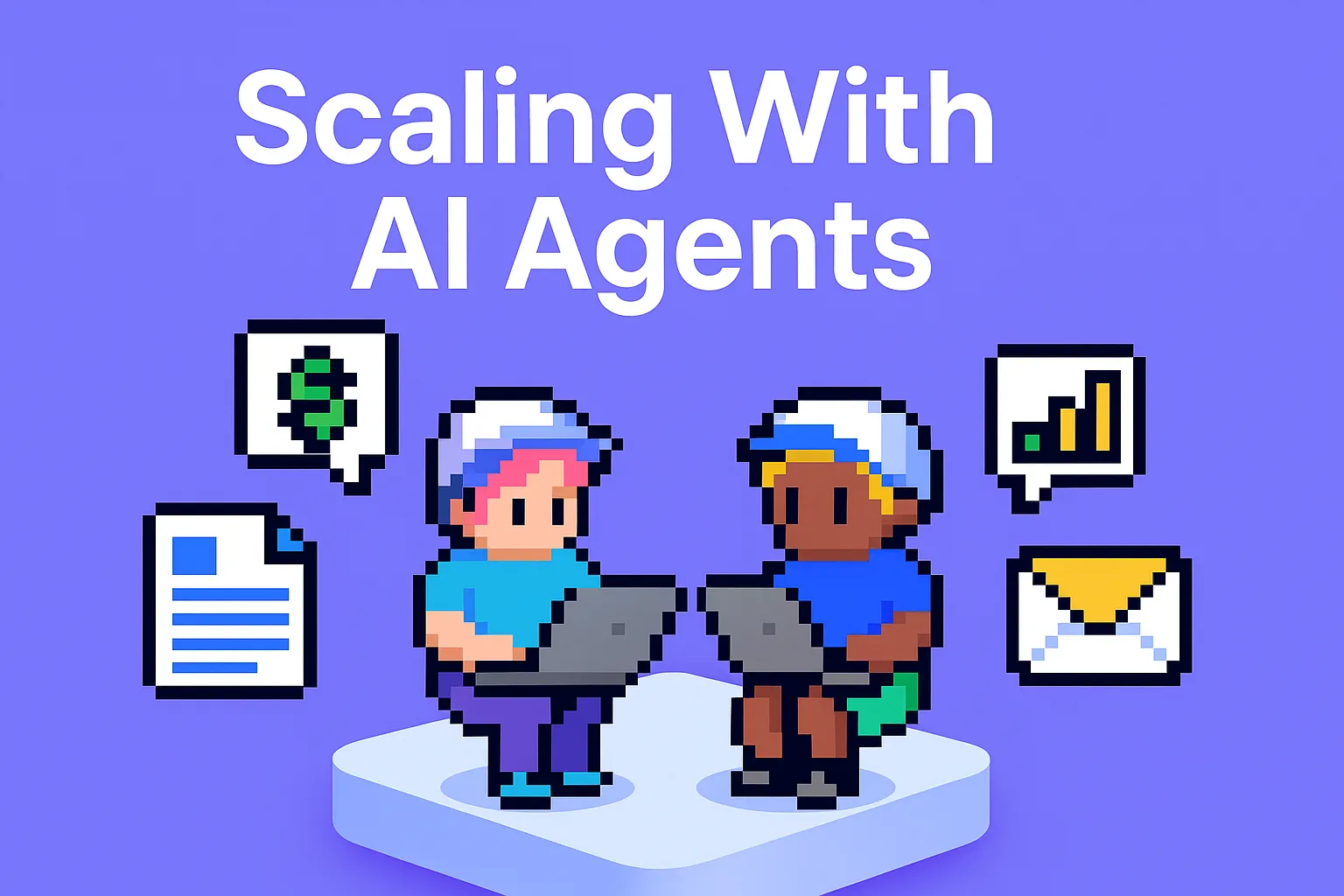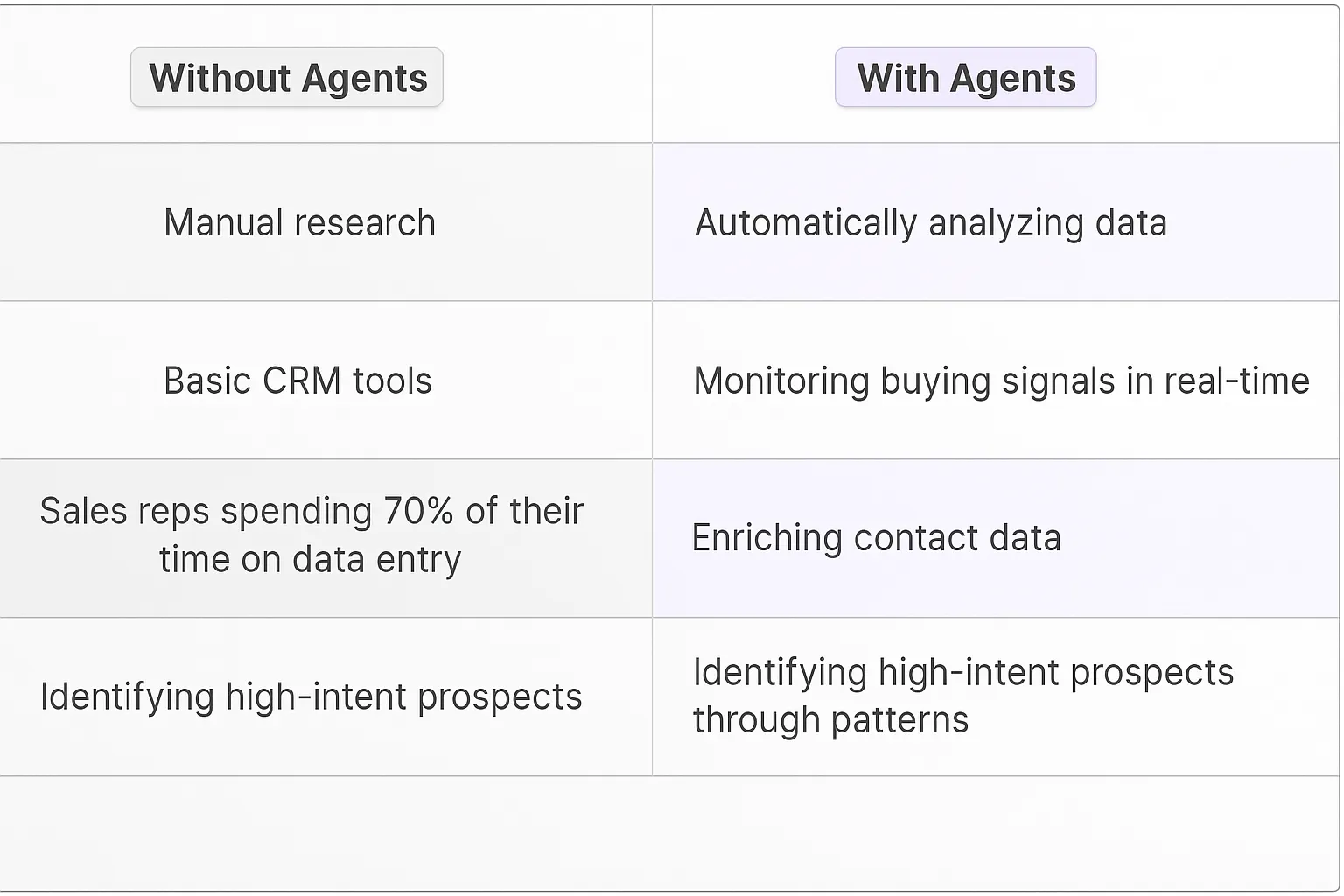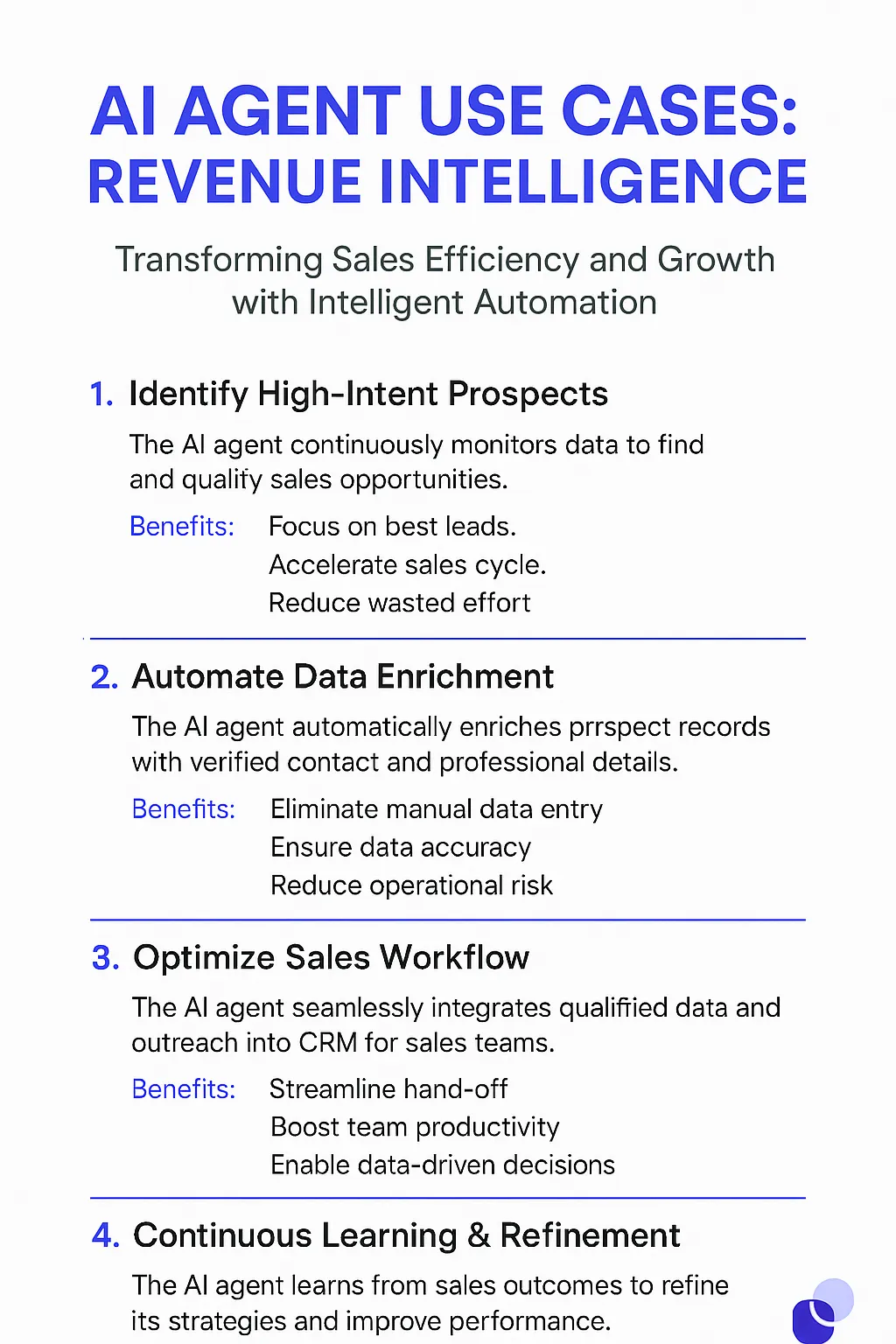Cognism
Understanding Cognism's AI-Powered Revenue Intelligence Platform
Cognism stands out as a revenue intelligence platform that leverages AI technology to transform B2B prospecting and sales operations. The platform combines comprehensive company data, contact information, and buying signals into actionable intelligence that drives revenue growth. Through its integration with AI Agents, Cognism has evolved beyond traditional data provision into an intelligent system that actively identifies and qualifies sales opportunities.
Key Features of Cognism
The platform's core strengths lie in its ability to:- Deliver real-time company intelligence and verified contact data- Monitor trigger events that signal buying intent- Automate data enrichment and validation processes- Generate actionable insights from historical sales patterns- Maintain compliance with global data protection regulations- Scale prospecting efforts while maintaining personalization

Benefits of AI Agents for Cognism
What would have been used before AI Agents?
Sales teams traditionally relied on manual prospecting methods and basic CRM tools to identify and connect with potential customers. The process involved countless hours scanning LinkedIn profiles, company websites, and business directories while manually entering data entry into spreadsheets. Sales development representatives (SDRs) would spend up to 70% of their time on research and data entry rather than having meaningful conversations with prospects.
What are the benefits of AI Agents?
AI Agents transform Cognism's B2B prospecting capabilities through intelligent automation and pattern recognition. These digital teammates analyze vast datasets to surface high-intent buyers based on technographic and firmographic signals - something that would take human teams weeks to accomplish manually.
The agents continuously monitor buying signals across multiple channels, identifying when target accounts show signs of being ready to purchase. This real-time intelligence helps sales teams focus their outreach on the prospects most likely to convert.
A key advantage is the agents' ability to enrich contact data automatically. When they detect missing or outdated information, they fill in the gaps by cross-referencing multiple verified data sources. This ensures sales teams always work with accurate, complete contact records.
The pattern recognition capabilities allow these digital teammates to identify common characteristics among successful deals and flag similar opportunities. They can spot subtle indicators that a human might miss - like changes in a company's tech stack or hiring patterns that suggest readiness to buy.
For sales operations leaders, the agents provide unprecedented visibility into pipeline health through automated data quality monitoring. They flag potential issues early, allowing teams to course-correct before deals are impacted.
The end result is a more focused, data-driven sales motion where human sellers can dedicate their energy to building relationships and closing deals rather than getting bogged down in research and administrative tasks.

Potential Use Cases of AI Agents with Cognism
Processes
Sales teams using Cognism can deploy AI agents to transform their prospecting and lead generation efforts. The agents analyze buying signals and company data points across multiple databases, identifying prospects that match ideal customer profiles with remarkable precision. They monitor trigger events like leadership changes, funding rounds, and expansion announcements - the exact moments when companies are most likely to need your solution.
The AI agents continuously refine their understanding of successful sales patterns by studying historical win/loss data. They surface insights about which combinations of company attributes, timing, and outreach strategies yield the highest conversion rates. This creates a feedback loop that gets smarter with each interaction.
Tasks
AI agents excel at the detail-oriented work of maintaining data hygiene in Cognism. They automatically:- Enrich contact records with verified email addresses and phone numbers- Update outdated company information- Remove duplicate entries- Flag data anomalies for human review- Track prospect job changes across companies
For sales development representatives, AI agents can draft personalized email sequences based on prospect research. They analyze company news, social media activity, and industry trends to craft relevant conversation starters. The agents learn which messaging resonates best with different buyer personas and industries.
On the account management side, AI agents monitor client usage patterns and engagement metrics. They proactively identify accounts that may need additional support or present expansion opportunities. The agents can even suggest talking points for quarterly business reviews based on platform analytics.
For sales operations teams, AI agents generate detailed reports on prospecting activity, pipeline velocity, and conversion rates across different market segments. They surface actionable insights about which types of companies move through the sales process most efficiently.
The true power emerges when these capabilities work in concert - creating a synchronized system that identifies ideal prospects, engages them effectively, and continuously optimizes based on results. This transforms Cognism from a data provider into an intelligent sales acceleration platform.

Industry Use Cases
Cognism's AI agents are transforming how sales and revenue teams operate across multiple sectors. The real power lies in their ability to handle complex B2B prospecting tasks that traditionally consumed countless human hours. From financial services firms mining qualified leads to SaaS companies building targeted account lists, these digital teammates adapt to distinct industry requirements while maintaining compliance and data accuracy.
The applications extend beyond basic prospecting - we're seeing marketing agencies leverage these agents to enrich their client databases with fresh, verified contact information, while professional services firms use them to map out entire organizational structures of potential clients. What makes this particularly compelling is how the AI learns and refines its approach based on industry-specific conversion patterns and engagement data.
Looking at actual deployment scenarios helps illustrate the concrete value these agents deliver. Rather than just automating existing processes, they're enabling entirely new workflows that weren't previously possible at scale. The following examples demonstrate how different sectors are implementing these capabilities to drive measurable business outcomes.
Technology Industry: Scaling Sales Intelligence for SaaS Growth
SaaS companies face a unique challenge - identifying qualified prospects in an increasingly crowded market where buying signals are complex and constantly evolving. The traditional approach of manually researching companies and decision-makers simply doesn't scale when you're targeting enterprise customers across multiple geographies.
A Cognism AI Agent transforms this process by continuously monitoring technographic data, funding rounds, and leadership changes across potential customers. For example, when a mid-market software company adds a new CTO or receives Series B funding, the AI agent automatically flags this as a high-value opportunity and enriches the lead with verified contact information.
The real power emerges in how the AI agent adapts its targeting based on closed-won deal patterns. If deals consistently close faster when prospects have recently switched their tech stack or expanded into new markets, the agent automatically prioritizes similar companies and surfaces them to sales teams. This creates a continuous feedback loop where each successful deal makes the targeting more precise.
Beyond just finding leads, the AI agent analyzes successful sales conversations and deal progression to identify which messaging resonates with different technical buyer personas. A VP of Engineering responds differently to security and scalability discussions compared to a CTO focused on TCO and strategic roadmap alignment.
The compound effect is significant - sales teams spend more time having meaningful conversations with qualified buyers instead of trying to piece together prospect data from disparate sources. For high-growth SaaS companies scaling their enterprise sales motion, this targeted intelligence translates directly into faster deal cycles and higher conversion rates.
Financial Services: Unlocking Deal Flow Through AI-Powered Intelligence
Investment banks and private equity firms operate in an environment where timing and relationship intelligence determine deal success. The challenge isn't just finding prospects - it's identifying companies at the precise moment they're ready for a transaction, whether that's M&A, fundraising, or strategic partnerships.
A Cognism AI Agent fundamentally changes this dynamic by monitoring thousands of private companies for subtle signals that indicate deal readiness. When a mid-market manufacturer starts expanding their executive team, files new patents, or shows rapid revenue growth, the AI agent correlates these data points to flag potential opportunities before they hit the broader market.
The sophistication comes from how the AI agent builds relationship maps across portfolio companies, board members, and executive networks. For example, when analyzing a potential acquisition target, the agent automatically surfaces shared board connections, past deals between leadership teams, and overlapping investor relationships - insights that traditionally required weeks of manual research.
Deal teams gain a particular edge in competitive processes through the agent's ability to track buyer behavior patterns. The AI learns which combinations of company attributes, growth metrics, and market positions led to successful transactions in specific sectors. This pattern recognition helps firms focus on opportunities that align with their investment thesis and historical win rates.
The network effects become powerful as more deals flow through the system. Each transaction enriches the AI's understanding of industry-specific deal drivers, valuation metrics, and relationship dynamics. For Investment banks competing for premium assets, this compound intelligence advantage translates into faster sourcing, stronger relationships, and ultimately better returns.
Considerations for Cognism AI Implementation
Implementing Cognism AI agents requires careful planning and strategic thinking around both technical infrastructure and team dynamics. Organizations need to evaluate their current tech stack compatibility, data governance policies, and team readiness before deployment.
Technical Considerations
The foundation of a successful Cognism AI implementation starts with robust data architecture. Teams must ensure their CRM systems can handle bi-directional data flow and maintain data integrity during AI-driven updates. API rate limits, data synchronization delays, and system redundancies need thorough evaluation.
Security protocols require updates to accommodate AI agent access patterns while maintaining compliance standards. This includes implementing proper authentication mechanisms, audit trails, and data encryption at rest and in transit.
Operational Considerations
Sales teams need clear guidelines on AI agent capabilities and limitations. Setting realistic expectations about lead quality, response accuracy, and automation boundaries prevents friction during the adoption phase. Creating standardized processes for handling AI-flagged exceptions and edge cases maintains operational efficiency.
Training requirements extend beyond basic tool usage - teams need to understand how to interpret AI-generated insights and when to override automated decisions. This requires developing new skills in data interpretation and AI collaboration.
Integration Challenges
Legacy systems often present compatibility issues with modern AI implementations. Organizations frequently encounter data format mismatches, API version conflicts, and workflow disruptions during integration. Custom middleware development may be necessary to bridge these gaps.
Change management becomes crucial as teams adapt to new workflows. Resistance to AI adoption can emerge from concerns about job security or skepticism about AI accuracy. Clear communication about AI's role as a digital teammate rather than a replacement helps address these concerns.
Performance Monitoring
Establishing meaningful metrics for AI agent performance requires careful consideration. Traditional sales KPIs may need adjustment to account for AI-augmented processes. Creating dashboards that track both AI accuracy and business impact helps justify the investment and identify optimization opportunities.
Regular audits of AI decisions and outcomes help maintain quality control and identify potential biases or systematic errors that need correction. This feedback loop is essential for continuous improvement of the AI system.
AI-Powered Evolution of B2B Sales Operations
The integration of AI Agents with Cognism represents a fundamental advancement in how B2B sales teams operate. By automating data-intensive tasks and surfacing actionable insights, these digital teammates enable sales professionals to focus on what matters most - building relationships and closing deals. The technology's ability to learn from success patterns and adapt to industry-specific requirements makes it particularly valuable for organizations looking to scale their revenue operations efficiently.
The impact extends beyond mere efficiency gains - it's reshaping how organizations approach prospect identification, engagement, and relationship building. As AI technology continues to evolve, the combination of human expertise and AI capabilities will become increasingly central to successful B2B sales operations.













